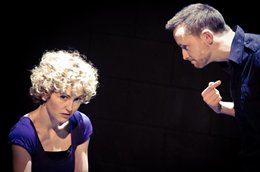In some ways Michael West’s A Play on Two Chairs, written in 1989, should be considered a period piece. When West devised and staged his play as student at Trinity College Dublin, laws allowing the widespread availability of contraception was still being debated, the Celtic Tiger had yet to take hold, and the passing of the constitutional amendment repealing the prohibition of divorce was still six years away. Obviously, a lot has happened since then. After twenty years of economic and social upheaval, not to mention the proliferation of alternative approaches to making theatre in Ireland, the motive behind staging this piece now, with hardly a comment from director Leona Nally, seems a little unclear. In fact, the gamesome way its two characters, impersonally marked as He and She, engage in an hour-long battle of the sexes with the help of two chairs can come across twenty years later as a naïve and unadventurous stab at experimenting with “physical theatre”.
Taken in the context of West’s development as a writer and the period in which it was written, the play can be seen as the first tentative steps of a theatre artist experimenting with the intricacies of physical stage grammar as divorced from the constraints of narrative. It makes no pretensions towards being a play in the traditional sense. Rather, it’s ‘play’ in the child-like sense, a fun and goofy game of physical and verbal give and take, where the rules change on demand and relationships to people and objects are transformed and evolve with the introductions of an offhand word or gesture.
 At the centre, of course, are two chairs, which in this production are given their own bios in the programme. Performers Andrew Adamson and Karoline Rose O’Sullivan enter the space at the start like musicians taking the stage, and for the most part their performances reflect the function of strict interpreters of a prewritten score rather than active collaborators in spontaneous event. After sitting stiffly in their chairs, taking in the audience, the two actors wriggle uncomfortably in their seats, and this innocuous physical phrase grows into a series of interactions that are part mime, part dance. Chairs readily become horses, trains, or blunt weapons. This purely physical dialogue between the two reaches a fevered pitch and is then segmented by a blackout. We’re then reintroduced to the pair as they add spoken dialogue to their physical interactions, embodying a host of roles and fantastical situations.
At the centre, of course, are two chairs, which in this production are given their own bios in the programme. Performers Andrew Adamson and Karoline Rose O’Sullivan enter the space at the start like musicians taking the stage, and for the most part their performances reflect the function of strict interpreters of a prewritten score rather than active collaborators in spontaneous event. After sitting stiffly in their chairs, taking in the audience, the two actors wriggle uncomfortably in their seats, and this innocuous physical phrase grows into a series of interactions that are part mime, part dance. Chairs readily become horses, trains, or blunt weapons. This purely physical dialogue between the two reaches a fevered pitch and is then segmented by a blackout. We’re then reintroduced to the pair as they add spoken dialogue to their physical interactions, embodying a host of roles and fantastical situations.
Nearly every vignette carries with it a flavour of sexual innuendo, but the lack of chemistry between the two performers dampens any possible sexual charge, a shame as a continuous cycle of sexual aggression and sexual repression seems meant to propel the action. It’s difficult to demonstrate repressed desire when hardly any real desire is generated. Part of the problem lies in some of the sexual clichés in West’s script, like the desperate miming of a train running speedily into a waiting tunnel, an image which seems tame in light of the conscious infusion of sex into many aspects of contemporary Irish life today. But the cautious nature of the performances reinforces the somewhat prudish nature of West’s scenarios. The effect is slightly that of teenagers playing awkwardly at being sexually aware, rather than mature performers willingly jumping headlong into tackling the roiling mess that is adult sexuality. This isn’t entirely Adamson and O’Sullivan’s fault, as Nally’s directorial approach could have offered up more opportunities for surprise and spontaneity, and going some way towards shaking the performers out of their conservative, preprogrammed staging.
Still, Nally’s use of lighting transitions does add an interesting dimension to the ebb and flow of the proceedings. With the help of some detailed mime work from the performers, the simply lit but effectively eerie underwater sequences add a dash of danger to the playfulness. Adamson and O’Sullivan come across as competent movers, complementing the easy charm of the script, and they never fail to take opportunities to connect directly with the audience, though those moments still feel a bit staged and artificial at times. It feels like what this production needs is to shake the script free from the relative innocence of its pre-Celtic Tiger context, and really push the physical score that West provides to its limits. After experiencing the energy, spontaneity, and danger exhibited by Michael West’s more accomplished later work with The Corn Exchange, it’s hard not to view this production as a throwback to another era.
Jesse Weaver was recently awarded a PhD in Theatre Studies from UCC, and is a playwright.